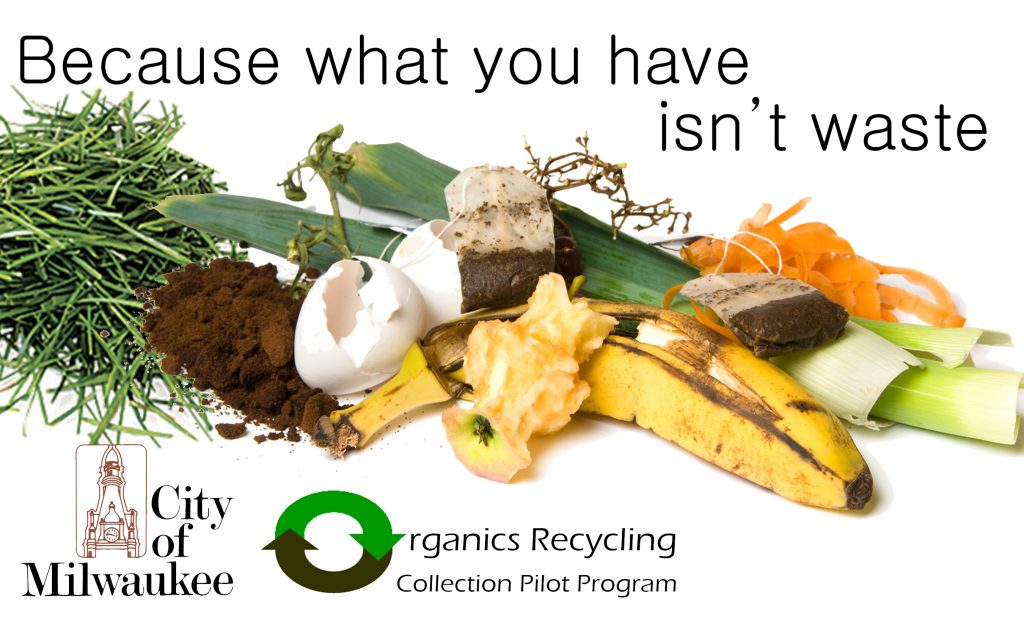City Hopes to Expand Composting
Seeks permanent compost program. Pilot program composts 194 tons of food waste annually.
The Department of Public Works (DPW) is seeking partners to build and run a citywide compost program, building off a successful test project running in select city neighborhoods.
The opt-in program was originally envisioned as a “one-year pilot program,” but has been operating continuously since 2016, diverting more than 194 tons of waste per year. It was originally requested by Alderman Tony Zielinski and co-sponsored by Ald. Robert Bauman and Nik Kovac.
Program participants, approximately 540 today, currently pay an additional monthly fee of $12.75 and put their organic food waste in a special 65-gallon container. Compost Crusader has served as the city’s contractor on the effort, picking up the organic waste and processing it into compost at Blue Ribbon Organics in Caledonia. DPW provides a $1 per month per subscriber subsidy to Compost Crusader in addition to the customer fee in recognition of its estimated landfill savings (720 pounds annually per participant).
A request for proposals (RFP) issued by DPW would require prospective vendors to establish a permanent program by committing to operating it for a minimum of five years and provide a growth plan for providing citywide service.
Residents currently eligible to participate include those living in one-to-four unit buildings east of Interstate 43 from W. Capitol Dr. to W. Howard Ave. This includes residents of the East Side, Riverwest, Harambee, Walker’s Point and Bay View. Those boundaries at a minimum would be maintained under a new contract.
Under terms of the RFP, the city is considering bids for yard-waste only pickup, as opposed to the current program which includes food waste. An op-ed written by Mary Lou Lamonda accused the city of “quietly ending its successful [program]” by making food waste pickup optional in the bids. But DPW officials say that’s not the case.
“The Department of Public Works will not end the current food waste pilot program or make changes without notifying participants,” wrote a DPW spokesperson in response. “The City of Milwaukee remains committed to increasing sustainability and reducing landfill waste and our impact on the environment. Diverting organic waste, including food, is a major part of that effort. The Organics Pilot Program saw high demand and DPW agrees with participants and organic waste advocates: we should find ways to expand this service. The RFP states clearly that these proposals are the first step in that expansion.”
Responses to the city’s RFP are due March 6th. The new service could start as early as July 1st, 2020.
If you think stories like this are important, become a member of Urban Milwaukee and help support real, independent journalism. Plus you get some cool added benefits.
Political Contributions Tracker
Displaying political contributions between people mentioned in this story. Learn more.
City Hall
-
Council Blocked In Fight To Oversee Top City Officials
 Dec 16th, 2025 by Jeramey Jannene
Dec 16th, 2025 by Jeramey Jannene
-
Latest Effort to Adopt New Milwaukee Flag Going Nowhere
 Dec 3rd, 2025 by Jeramey Jannene
Dec 3rd, 2025 by Jeramey Jannene
-
After Deadly May Fire, Milwaukee Adds New Safety Requirements
 Dec 2nd, 2025 by Jeramey Jannene
Dec 2nd, 2025 by Jeramey Jannene























If you want organic waste, you should be heading to the grocery stores. I once worked in the produce department of a local grocer, and two or more fifty-pound bags of organic waste daily from the produce department alone was typical. The bakery and deli had similar amounts, and it all went in the same dumpster as everything else. From the standpoint of an employee, there would be very little additional effort to deposit waste in separate containers. From the standpoint of a store manager, most do not have the authority to initiate a composting program on their own. The issue boils down to two things: 1) a lack of will at the corporate level, and 2) the fact that corporate level management does not synchronize well with government at the municipal level. There needs to be some changes in order to make this happen.
Gleaning is one answer but the real fix is again in the system and the source: an agricultural system that produces excess and a consumer that wants perfect unblemished freshness. When you grow your own you cut out the bad parts and sauce what you can.